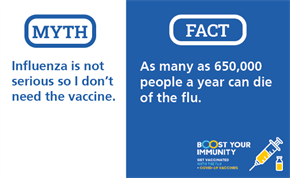
Influenza, or flu, is a highly transmissible and serious infectious disease caused by a virus. It occurs in the winter months. Flu symptoms come on suddenly and sometimes severely - and as flu is a virus, antibiotics won’t help. Symptoms include fever, chills, headaches and aching muscles, as well as a cough and sore throat.
Sometimes people call a bad cold the flu, but having flu is much worse. In fact, as many as 650,000 people a year can die of the flu. This only represents respiratory deaths, so the likely impact is even higher.
As a health or social care worker, you’re more likely to be exposed to the flu and COVID-19 viruses. You also care for people who may be at greater risk and it’s easy to pass these viruses on without knowing. Even healthy people can get the flu, but especially people whose immune systems are vulnerable. Most people will recover within a few weeks, but some can develop complications including bronchitis, sinus and ear infections, pneumonia, heart or brain inflammations.
Having your flu vaccine will help protect you and your family and friends from potentially serious illness, as well as the people you provide care for. The risk of having a serious reaction to the flu vaccine is less than one in a million. It is much less than the risk of getting seriously ill from having the flu.
The flu vaccine is your best protection against the virus. It will not stop all flu viruses but if you do get flu after vaccination, it’s likely that the disease will be milder and shorter-lived than it would otherwise have been.
Please help to keep yourself, and those you care for, safe from getting flu by getting vaccinated as soon as you can.
Published 12th October 2022